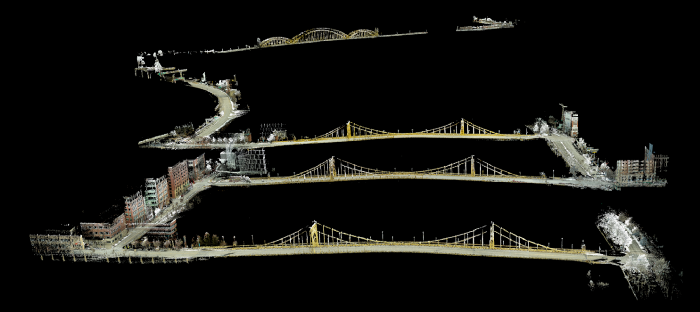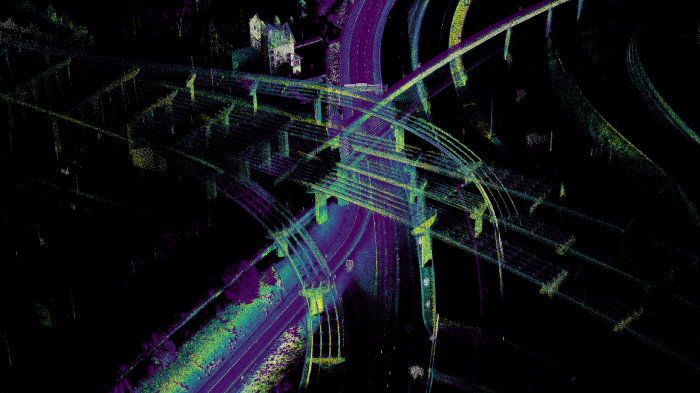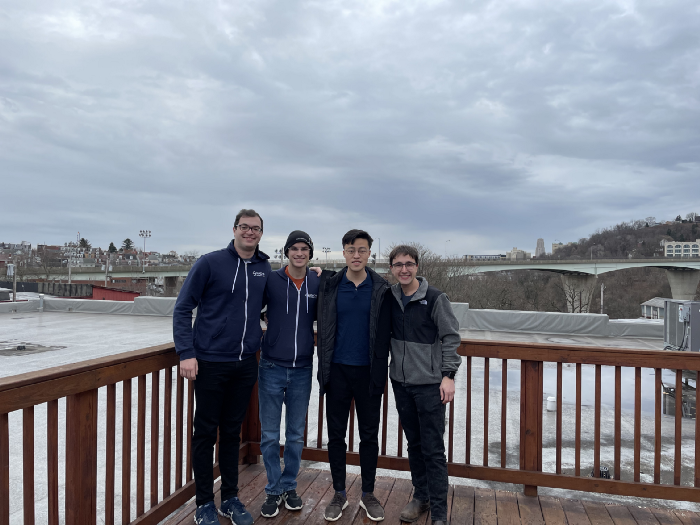A fast-growing Pittsburgh tech startup wants to help the city solve its infrastructure problems. As residents know, it’s a mission that couldn’t be fulfilled sooner.
Founded in 2021, Bloomfield-based startup Mach9 Robotics launched a new effort this week to use its integrated hardware and mapping software to provide bridge inspections and assessments in response to the collapse of the Fern Hollow Bridge last Friday. The Pittsburgh Bridge Initiative, as the company is calling it, will involve a concerted program to map, monitor and assess the approximately 450 bridges in the Pittsburgh region over the next year.
After meeting at Carnegie Mellon University’s Robotics Institute, Mach9’s three cofounders — Alexander Baikovitz, Haowen Shi and Josh Spisak — joined last spring’s batch of companies in the prestigious accelerator Y Combinator, which helps startups workshop their ideas and provides them with access to early funding. Mach9’s support from Y Combinator, along with its first place win in last year’s CMU McGinnis Venture Competition and investments from Tiger Global Capital Management, Soma Capital and 99Tartans put the nascent company on Technical.ly’s first-ever Pittsburgh RealLIST Startups last month.
As for the new focus on bridges with this initiative, “this has been certainly a topic that has been critically on our mind ever since we started the company over a year ago,” said Baikovitz, who is also the startup’s CEO. “And really, the mission that we have is to develop technology to sense infrastructure failures.”

Not only does Mach9’s technology monitor infrastructure like bridges more efficiently than human workers can, he said, it actually does it better. Using its signature mobile mapping devices — called CUBEs — which are equipped with ground penetrating radar, thermal cameras, LiDAR sensors and more, Mach9 collects information to map qualities of both surface and underground models of bridges that aren’t visible to the human eye.
“What we see [CUBEs] doing is going out, collecting all of this relevant information, providing ways to process the information and find problems within it,” Baikovitz said, “and then empower the human inspectors and engineers and stakeholders so that they can make decisions” based on the data.
It’s no secret that infrastructure in the United States, and Pittsburgh, is failing. Since the collapse of the Fern Hollow Bridge, several local news outlets highlighted the 174 other bridges in the region with the same poor condition ratings. So, why the need for advanced technology to tell us something we already know?
“What we really want to be able to distinguish between is the difference between poor infrastructure and infrastructure that needs to be able to be shut down,” Baikovitz said. Right now, city and state governments might be so overwhelmed with the amount of infrastructure needing maintenance that they struggle to appropriately triage and prioritize the work needed. “We don’t necessarily think just adding sensing modalities is the only way to solve these types of problems, but we believe that there could be this chance that we can find something that a human just couldn’t see and that can prevent incidents like this from happening again in the future.”

Currently, Mach9 doesn’t have any formal partnerships with local government organizations in charge of infrastructure maintenance and repair. Baikovitz said a main focus of the first few months of this year will be in building up those relationships, as well as ones with other stakeholders like bridge inspectors and civil engineers. The key to Mach9’s revenue model, he added, relies on providing stakeholders and relevant organizations with the actionable insights and data that the CUBEs collect.
As for whether or not a city with an already stretched infrastructure budget would be open to a deal with Mach9, Baikovitz compares the need for this data to the healthcare industry.
“If you go to a doctor’s office and you get an X-ray or MRI, you’re able to diagnose issues that you can actually track over time,” he said, noting that the data these technologies provide enables medical professionals to take preventative action before a patient’s health issues become serious or terminal. “And that’s exactly what we see [as] the role of this technology. But in the infrastructure space, it’s being able to identify issues early enough so that you don’t have to remediate an entire bridge, or exercise tons of capital to be able to solve a problem that could have been prevented.”
Following a seed round of around $2.5 million in December, Baikovitz said Mach9 will use the capital to support new hiring across both technical and business development roles. Beyond the bridge initiative, Mach9 also has plans to assess applications for its technology in the utilities industry, as a potential way to address the high frequency of outages across the country every day.







